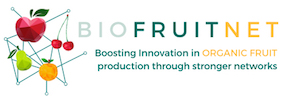Biofruitnet - Boosting Innovation in Organic Fruit Production through Stronger Networks

Boosting Innovation in Organic Fruit Production through Stronger Networks
Official webpage: https://biofruitnet.eu/
Strengthen organic fruit production in Europe.
Even though the European Union is the world's leading region for organic fruit production, imports of organic fruit from non-EU countries continue to increase. The reasons for this are that some fruit varieties cannot be grown in Europe, are not available seasonally or simply the demand cannot be met by European production. This trend poses a new challenge for European producers, i.e. to establish themselves in an increasingly competitive market. Furthermore, organic fruit growing is a very demanding form of cultivation because, unlike conventional agriculture, some problems cannot be solved with chemical-synthetic pesticides. Consequently, growers develop strategies and methods locally to protect their crops. In addition to this, various scientific research and experiments are conducted in EU countries to continue to improve organic fruit growing. The BioFruitNet project aims to build a well-functioning network that bridges the gap between research and farming practice and makes locally developed solutions available to other organic fruit growers in Europe.
Project aims
In order to strengthen European organic farming, the BioFruitNet project has five specific objectives:
1) to gather and summarise existing scientific and practical knowledge in organic farming (e.g. on diseases and pests, plant nutrition or variety suitability) that can be applied on a large scale in farming practice;
2) to build a strong European-wide innovation network for organic fruit growing in order to facilitate knowledge sharing between growers, researchers and advisors;
3) strengthen existing organic fruit-growing networks and ensure that there is a continuous exchange of information between researchers and practitioners on the one hand and between different regions of Europe on the other;
4) disseminate practical solutions to interested groups (growers, agricultural students, advisors) using simple and intuitive formats such as videos, tutorials, podcasts and short articles;
5) expand the organic growing information website https: //organic-farmknowledge. org and strengthen it as a reference platform for growers and advisors.
Project partner
- Naturland – Verband für Ökologischen Landbau e. V. (Germany) (LEAD PARTNER)
- Versuchszentrum Laimburg (Italy)
- Instytut Ogrodnictwa (Poland)
- Institut Technique de l’Agriculture Biologique (France)
- International Federation of Organic Agriculture Movements (IFOAM) European Union Regional Group (Sweden)
- Valor Ecologico CAAE (ECOVALIA) (Spain)
- Centro Internazionale di Altistudi Agronomici Mediterranei (Italy)
- Fördergemeinschaft Ökologischer Obstbau e. V. (FÖKO) (Germany)
- Forschungsinstiut für Biologischen Landbau Stiftung (FiBL) (Switzerland)
- Kobenhavns Universitet (Denmark)
- GartneriRådgivningen A/S (Denmark)
- Sveriges Lantbruksuniversitet (Sweden)
- Eurizon SL (Innovarum) (Spain)
- Delphy BV (Netherlands)
- Vyzkumny A Slechtitelsky Ustav Ovocnarsky Holovousy S.R.O. (Czech Republic)
- Association of Latvian Organic Agriculture (ALOA) (Latvia)
Project duration
01.11.2019 – 30.04.2023
Results and downloads:
- The codling moth is the main pest of apple trees. A guideline with possible agronomic measures and plant protection products has been developed for organic producers.
- The Apple scab is the main disease of apple trees. A guideline with possible agronomic measures and plant protection products has been developed for organic producers.
- The rosy apple aphid is a secondary pest which, if not managed properly during the growing season, can create considerable damage and losses. This guideline has been developed to contain the spread of this pest in organic farming.
- A video has been developed on how to manage apple scab in organic farming. This video will help organic producers in Europe to contain and reduce the pressure of this disease.
Contacts at Research Centre Laimburg
Markus Kelderer, Markus.Kelderer@laimburg.it, T. 0471 969 622
.jpg)
This project has received funding from the European Union’s Horizon 2020 research and innovation programme under Grant Agreement Nº 862850. This website reflects the views of the author(s) and does not necessarily reflect the views or policy of the European Commission. Whilst efforts have been made to ensure the accuracy and completeness of this document, the European Commission shall not be liable for any errors or omissions, however caused.
